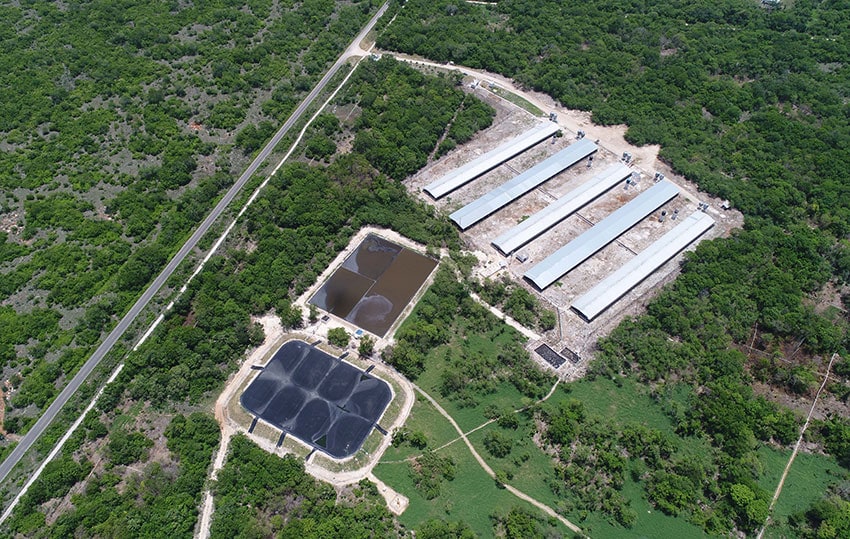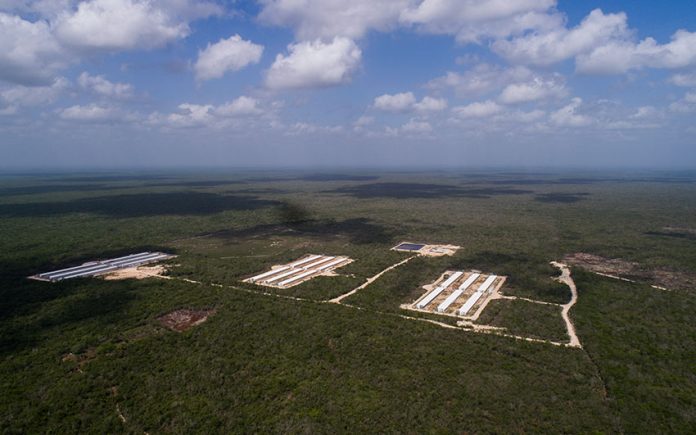Featuring vast landscapes of untouched jungle and one of the most extensive karst aquifer systems on the planet, the state of Yucatán is among the most biodiverse in the country. It is also a state where deforestation has claimed over one third of the jungle, mainly due to rapid agricultural development.
The state has recently become an epicenter for growth for the pork industry, and intensive pig farms have begun to appear amid the jungle landscape in areas inhabited by indigenous beekeepers and small farmers. With plans to establish more farms in the region come questions about the local impacts of intensive pig farming in Mexico.
Those questions triggered an official complaint by citizens in partnership with several NGOs and resulted in the closure of four Yucatán pig farms due to environmental concerns in May.
The environmental protection agency, Profepa, announced the closures after carrying out inspections of farms in the municipalities of Maxcanú, Kinchil, Opichén and Mérida. It found a lack of environmental impact assessment results and inadequate management and reporting of hazardous waste and wastewater.
Profepa said it plans to address environmental concerns and come up with strategies to evaluate environmental impact in lowland forest areas before issuing authorizations.
According to Juan Carlos Anaya Castellanos, director of the Mexican Agricultural Markets Consulting Group, the pork sector contributes significantly to the Mexican economy, accounting for 76 billion pesos in 2020. Production is on the rise: there was a 3.1% increase in 2020 over 2019 and a 3-4% increase is projected for this year.
Industrial pig farms on the Yucatán Peninsula represent 14% of all Mexican pig farms and are among those authorized to export pork to China, Japan, Korea, and the United States. The region has been marked as an advantageous area for the farms due to its water resources, its extensive territory, and its access to the United States and Asia through the port of Progreso.
Pork production on the peninsula increased by 36% between 2006 and 2018 and continues to grow.
According to Greenpeace México, there are 257 pork farms in the country, of which 122 (47%)“are in regions considered a priority for biodiversity conservation. Some of the farms in the western part of the state of Yucatán are near the Ria Celestún Biosphere Reserve, a protected area which forms part of a large wetland corridor.
A biologist and member of the beekeeping collective Maya Alliance for the Bees says that millions of liters of water are used to carry out intensive pig farming practices, and the wastewater is eventually deposited into the forest, polluting many hectares of land.
He was one of several citizens, most of them beekeepers, who spoke with Mexico News Daily on condition of anonymity.

A Maya beekeeper from the town of Kinchil said pools of wastewater from pig farms were discovered in the jungle nearby. “The farms have a treatment plant, but it doesn’t work perfectly. The water flows into the forest after that. In the area where we saw the water, we noticed that there were dead trees.”
Water pollution also affects the bee population that the local indigenous community relies upon to carry out their traditional livelihood. The majority of the inhabitants of the western part of the state, where intensive pig farming takes place, are indigenous Maya beekeepers and small scale cattle farmers.
Another member of the Maya Alliance for the Bees said traditional beekeeping relies on pure water and an intact ecosystem where the bees can collect pollen across their foraging area. “In beekeeping we have seen a decrease in the harvest. These problems didn’t exist before, and the harvest was very good … We have seen dead bees, but we don’t know why. That’s something we can’t know without laboratory tests.”
The beekeeper from Kinchil explained that local producers can no longer label their honey as organic since the bees are exposed to chemicals in the wastewater from the pig farms. “We can’t get organic certification because we are almost within two kilometers of the farm. Some beehives are within one kilometer of the farm. Two years ago an organic honey company approached us but we couldn’t get certified.”
In addition to the risk to their bees, locals worry that their own drinking water might be contaminated, especially indigenous farmers who drink water from shallow traditional Maya wells that typically measure less than six meters deep. The water table is very high in some areas in this region, increasing the likelihood of contaminated water reaching the shallow wells. In one area there is concern that the farms’ wastewater could reach a large reservoir that supplies water to the nearby city of Celestún.
Greenpeace took samples from wells in the area in 2020 and detected the presence of coliform bacteria in the water, concluding that the National Water Commission should monitor the water quality in the area frequently, and that local communities should have access to the information.
The anonymous beekeeper from the town of Kinchil says he hopes that the local indigenous community will be integrated into ongoing monitoring and decision making around the pig farms in the future.
“We would like to be part of a team of local caretakers of the region, and participate in water sampling. We aren’t against the company, we are against what could happen if people begin to get sick and native species are damaged. We aren’t going to stop the company if it is doing things correctly.”
Mexico News Daily
